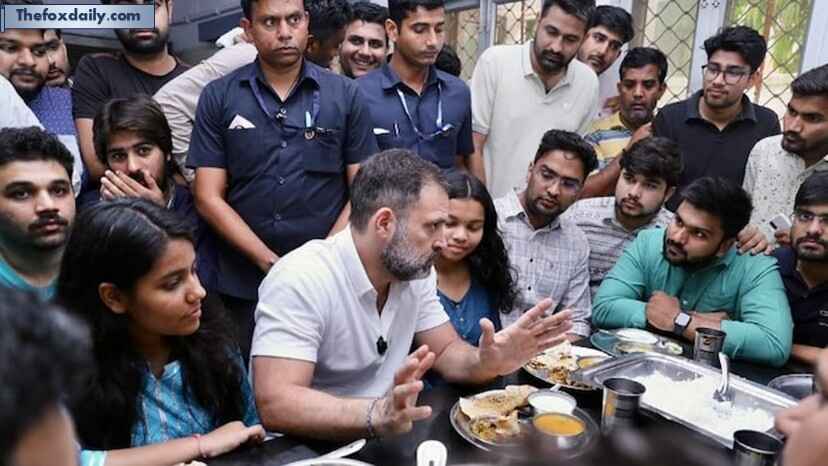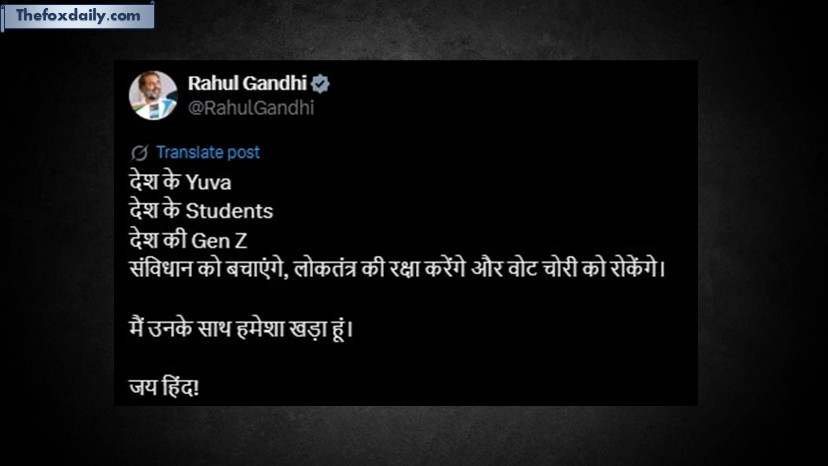
Congress leader Rahul Gandhi has broadened his political narrative by directly addressing India’s Gen Z, the young demographic born between 1997 and 2012. While he has long spoken about students and the youth, his latest remarks invoked Gen Z explicitly, pledging their role in fighting “vote chori” (electoral Fraud). His statement came just hours after presenting alleged voter fraud evidence and days after Nepal witnessed violent, Gen Z-led protests that forced Prime Minister KP Sharma Oli to resign.
The move triggered sharp criticism from the BJP, with former Union Minister Anurag Thakur accusing Gandhi of “misleading the youth” and attempting to engineer unrest in India similar to Bangladesh or Nepal. But is this the first time Rahul Gandhi has turned to Gen Z for political messaging? The answer, as history shows, is both yes and no.
Rahul Gandhi and Gen Z: A History of Engagement

Although this is the first time Gandhi explicitly invoked “Gen Z” in a political statement following Nepal’s turmoil, it isn’t his first attempt at engaging them. In May 2023, he hosted a “Gup-Shup over Lunch with the Gen Z” during a surprise visit to Delhi University’s postgraduate men’s hostel. Over simple hostel food—dal, roti, and sabzi—he held candid conversations on unemployment, joblessness, and inequality. The informal meeting, though controversial, showcased his intent to connect with young, tech-savvy Indians long before Nepal’s upheaval.
Did Nepal’s Gen Z Protests Inspire Rahul Gandhi?
The timing of Gandhi’s outreach coincided closely with Nepal’s Gen Z-driven uprising, which escalated after KP Sharma Oli imposed a nationwide ban on social media amid corruption and authoritarianism allegations. What began as online dissent among frustrated youth soon spilled onto the streets, leaving more than 70 dead and hundreds injured as protesters stormed parliament and government buildings.
Oli was eventually forced to resign, paving the way for former Chief Justice Sushila Karki to take over as interim Prime Minister on September 12. The visuals of burning state infrastructure and the mobilization of Gen Z protesters dominated global headlines and social media. According to BJP leaders, Rahul Gandhi’s remarks days later were no coincidence, but an attempt to leverage Nepal’s unrest to energize Indian youth against the Modi government.
BJP Criticism of Rahul Gandhi’s Gen Z Pitch

Rahul Gandhi’s statement on X read: “The youth of the country, the students of the country, the Gen Z of the country will save the Constitution, protect democracy, and stop vote theft. I always stand with them.”
The post came shortly after his press conference where he presented what he called “undeniable proof” of software-driven voter deletions in Karnataka’s Aland Assembly constituency, accusing the BJP of collusion with the Election Commission.
BJP leaders quickly struck back. Anurag Thakur labeled Gandhi’s comments a plot to provoke anarchy, claiming he was playing “infiltrators-first politics” and protecting fake votes under the guise of empowering Gen Z. He compared Gandhi’s claims of a “hydrogen bomb” revelation on voter fraud to mere “firecrackers.”
Similarly, BJP MP Nishikant Dubey argued that Gen Z rejects dynastic politics and questioned why youth would support Rahul Gandhi after decades of family-led Congress rule. Meanwhile, the Election Commission dismissed Gandhi’s voter fraud allegations as “baseless and incorrect.”
Rahul Gandhi’s Consistent Youth-Centric Messaging
While the Gen Z branding is relatively new in his speeches, Rahul Gandhi’s outreach to young Indians has been consistent. From selfies during the Bharat Jodo Yatra to meetings with gig workers and unemployed graduates, his strategy has often highlighted the frustrations of India’s younger population.
However, his explicit call to Gen Z on September 18 marked a rhetorical shift. Unlike his 2023 hostel visit described as “gup-shup,” his latest remarks placed a direct burden on Gen Z to “save the Constitution, protect democracy, and stop vote chori.” This framing, according to the BJP, undermines trust in India’s democratic institutions.
Congress leaders, however, defended Gandhi’s statement. Party spokesperson Pooja Tripathi said Gen Z is driving a “silent revolution,” arguing that their impatience with hypocrisy is evident in how they use memes and digital platforms to question authority. She added, “Gen Z is not only democracy’s future, but also its reflection.”
Gen Z in Indian Politics: A Growing Force

India has more than 360 million Gen Z citizens, making them a powerful political bloc. Unlike previous generations, they are digital natives who prioritize authenticity and accountability. Congress believes their participation could reshape political engagement in India—from rallies to reels, and from traditional campaigns to viral online movements.
So, did Rahul Gandhi invoke Gen Z because of Nepal’s protests? Not entirely. He has referenced them before, though rarely in such direct political terms. Yet, the timing has fueled speculation and given the BJP ammunition to accuse him of destabilizing tactics.
As India moves closer to critical elections, Rahul Gandhi’s Gen Z outreach underscores a battle for the country’s youngest voters—a demographic that could decisively influence the nation’s political future.
For breaking news and live news updates, like us on Facebook or follow us on Twitter and Instagram. Read more on Latest India on thefoxdaily.com.






COMMENTS 0